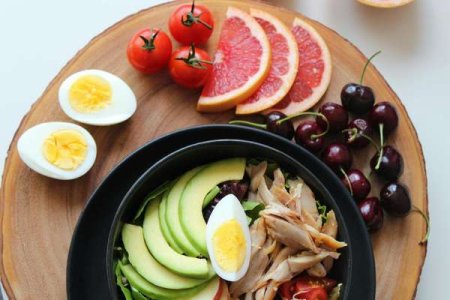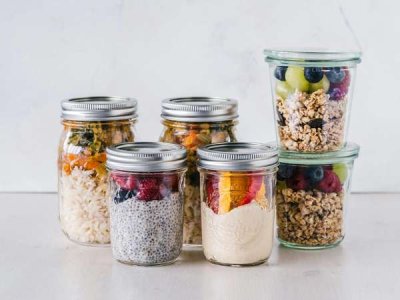The ultimate guide to an anti-inflammatory diet – eat this, not that!
- Replies 0
As we gracefully age, the needs of our bodies and health evolve, and so should our diets. For those in the golden years, paying attention to what we eat becomes even more crucial.
Inflammation, a term that often pops up in health discussions, can be a silent adversary, contributing to a host of age-related issues, including arthritis, heart disease, and even cognitive decline.
But fear not, dear readers of The GrayVine, because an anti-inflammatory diet can be your shield against these ailments. Let's embark on a culinary journey that not only tantalizes your taste buds but also fortifies your health.
Inflammation is like a double-edged sword. On one side, it's your body's natural defense mechanism, a critical part of the healing process when you're injured or under attack by germs.
However, when inflammation lingers, it becomes chronic, and that's when the trouble starts. Chronic inflammation is a stealthy health destroyer, often working in the shadows, contributing to diseases that can severely impact our quality of life as we age.

Imagine a diet that not only helps manage your weight but also boosts your mood, energy, and overall well-being. That's the promise of an anti-inflammatory diet.
It's not a fad or a quick fix; it's a lifestyle choice that champions whole foods and natural ingredients over processed options. Here's how you can make the switch:
1. Embrace the Rainbow on Your Plate
Colorful fruits and vegetables are packed with phytonutrients, the natural compounds that fight off inflammation. Each color represents a different set of antioxidants and benefits, so mix and match:
- Go green with spinach, kale, and broccoli.
- Opt for orange with carrots and sweet potatoes.
- Pick purple with eggplants and berries.
- Choose red with tomatoes and red bell peppers.
2. Favor Fish and Poultry Over Red Meat
Fish like salmon and mackerel are rich in omega-3 fatty acids, known for their anti-inflammatory properties. Poultry, when prepared healthily, can be a great source of lean protein. Try to limit red meat, which can contribute to inflammation when consumed in excess.
3. Whole Grains for the Win
Refined grains are stripped of their nutritional value and can trigger inflammation. Instead, choose whole grains like brown rice, quinoa, and oats, which retain their fiber and nutrients, promoting a healthy gut and reducing inflammation.

4. Nuts, Seeds, and Healthy Fats
Almonds, walnuts, flaxseeds, and chia seeds are not only delicious but also rich in anti-inflammatory fats. Olive oil, particularly extra-virgin olive oil, is another excellent choice for cooking and dressings.
5. Probiotics and Fermented Foods
A healthy gut is a cornerstone of an anti-inflammatory diet. Incorporate probiotic-rich foods like Greek yogurt, kefir, kimchi, and sauerkraut to support your gut health.
6. Herbs and Spices: The Flavorful Defenders
Turmeric, ginger, garlic, and cinnamon aren't just for adding zest to your meals; they're also powerful anti-inflammatory agents. Turmeric, in particular, contains curcumin, which has been shown to rival the effectiveness of some anti-inflammatory drugs.
Foods to Avoid: The Inflammatory Culprits
Just as important as knowing what to eat is knowing what to avoid. Here's a quick list of foods that can exacerbate inflammation:
- Processed and fried foods
- Sugary snacks and beverages
- Refined carbohydrates like white bread and pastries
- Excessive alcohol
- Trans fats found in margarine and some processed foods
Adopting an anti-inflammatory diet isn't about instant gratification. It's about making consistent, mindful choices that, over time, can transform your health.
Dr. Uma Naidoo, a nutritional psychiatrist, emphasizes that it takes about a month for the benefits to start showing, particularly in gut health.

Have you tried an anti-inflammatory diet? What changes have you noticed? Do you have favorite recipes or tips to share? Share your insights in the comments below!
Inflammation, a term that often pops up in health discussions, can be a silent adversary, contributing to a host of age-related issues, including arthritis, heart disease, and even cognitive decline.
But fear not, dear readers of The GrayVine, because an anti-inflammatory diet can be your shield against these ailments. Let's embark on a culinary journey that not only tantalizes your taste buds but also fortifies your health.
Inflammation is like a double-edged sword. On one side, it's your body's natural defense mechanism, a critical part of the healing process when you're injured or under attack by germs.
However, when inflammation lingers, it becomes chronic, and that's when the trouble starts. Chronic inflammation is a stealthy health destroyer, often working in the shadows, contributing to diseases that can severely impact our quality of life as we age.

An anti-inflammatory diet, rich in fruits, vegetables, whole grains, beans, fish, poultry, nuts, seeds, and olive oil, can help reduce inflammation in the body. Image source: Pexels / Jane Trang Doan.
Imagine a diet that not only helps manage your weight but also boosts your mood, energy, and overall well-being. That's the promise of an anti-inflammatory diet.
It's not a fad or a quick fix; it's a lifestyle choice that champions whole foods and natural ingredients over processed options. Here's how you can make the switch:
1. Embrace the Rainbow on Your Plate
Colorful fruits and vegetables are packed with phytonutrients, the natural compounds that fight off inflammation. Each color represents a different set of antioxidants and benefits, so mix and match:
- Go green with spinach, kale, and broccoli.
- Opt for orange with carrots and sweet potatoes.
- Pick purple with eggplants and berries.
- Choose red with tomatoes and red bell peppers.
2. Favor Fish and Poultry Over Red Meat
Fish like salmon and mackerel are rich in omega-3 fatty acids, known for their anti-inflammatory properties. Poultry, when prepared healthily, can be a great source of lean protein. Try to limit red meat, which can contribute to inflammation when consumed in excess.
3. Whole Grains for the Win
Refined grains are stripped of their nutritional value and can trigger inflammation. Instead, choose whole grains like brown rice, quinoa, and oats, which retain their fiber and nutrients, promoting a healthy gut and reducing inflammation.

Consistent anti-inflammatory eating can change the gut biome and reduce inflammation, with noticeable changes occurring in about a month. Image source: Pexels / Ella Olsson.
4. Nuts, Seeds, and Healthy Fats
Almonds, walnuts, flaxseeds, and chia seeds are not only delicious but also rich in anti-inflammatory fats. Olive oil, particularly extra-virgin olive oil, is another excellent choice for cooking and dressings.
5. Probiotics and Fermented Foods
A healthy gut is a cornerstone of an anti-inflammatory diet. Incorporate probiotic-rich foods like Greek yogurt, kefir, kimchi, and sauerkraut to support your gut health.
6. Herbs and Spices: The Flavorful Defenders
Turmeric, ginger, garlic, and cinnamon aren't just for adding zest to your meals; they're also powerful anti-inflammatory agents. Turmeric, in particular, contains curcumin, which has been shown to rival the effectiveness of some anti-inflammatory drugs.
Foods to Avoid: The Inflammatory Culprits
Just as important as knowing what to eat is knowing what to avoid. Here's a quick list of foods that can exacerbate inflammation:
- Processed and fried foods
- Sugary snacks and beverages
- Refined carbohydrates like white bread and pastries
- Excessive alcohol
- Trans fats found in margarine and some processed foods
Adopting an anti-inflammatory diet isn't about instant gratification. It's about making consistent, mindful choices that, over time, can transform your health.
Dr. Uma Naidoo, a nutritional psychiatrist, emphasizes that it takes about a month for the benefits to start showing, particularly in gut health.
Key Takeaways
- An anti-inflammatory diet, rich in fruits, vegetables, whole grains, beans, fish, poultry, nuts, seeds, and olive oil, can help reduce inflammation in the body.
- Chronic stress can lead to low-grade inflammation, increasing the risk of chronic disease and psychological distress.
- Consistent anti-inflammatory eating can change the gut biome and reduce inflammation, with noticeable changes occurring in about a month.
- Foods rich in polyphenols, antioxidants, probiotics, and key nutrients like magnesium can support stress management and regulate stress hormones.
Have you tried an anti-inflammatory diet? What changes have you noticed? Do you have favorite recipes or tips to share? Share your insights in the comments below!






